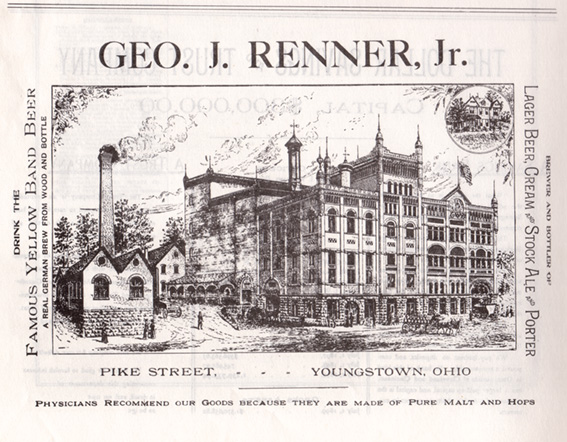YOUNGSTOWN, Ohio – Were this two years ago, one could stand atop the southern end of the Market Street Bridge, look to the west, and glance backward a century or more to view a piece of the brewing heritage of Youngstown.
There, on a hillside overlooking the Mahoning River, the shell of a decrepit red brick building built during the late 19th century was all that remained of the Renner Brewing Co., the longest operating brewery in the city’s history.
Today, just a portion of a concrete wall stands at the base of a hillside that descends from the Interstate 680 corridor. The structure – once the bottling operation – has since been razed for safety reasons.
A map of Youngstown dated 1899 shows the George J. Renner Jr. City Brewery snugly tucked inside a dense residential neighborhood along Pike Street, just off Oak Hill Avenue.
That same map also identifies the earliest known brewer in Youngstown – John Smith’s Sons Brewery – along what was then West Federal Street and today is Martin Luther King Jr. Boulevard.
Fueled by the arrival of English and German immigrants, the brewing industry took hold just as the population of Youngstown and the Mahoning Valley grew.
John Smith, born in Staffordshire, England, in 1813, immigrated to the United States in 1842 and moved to Youngstown in 1846. That year, he acquired a closed tannery on West Federal Street and repurposed the building into a brewery, according to Dr. Robert A. Musson’s “Brewing Beer in the Buckeye State.”
Smith’s operations began in July of that year. An advertisement July 4, 1896, displays a striking photo of the plant, designed with rooftop turrets and adorned with American flags to celebrate the brewery’s 50 years in business. Front and center is a diamond-shaped banner marketing its Standard Gold and Jewel Export ales.
The brewery continued to expand and reinvest in new equipment under new ownership. Smith Brewing Co., however, ceased production in 1919 after Ohio ratified the 18th Amendment that established Prohibition. To survive, the company switched its inventory to soft drinks and closed in 1925.
Today, nothing is left of the brewery. Yet relics continue to surface.
In November 2021, crews performing excavating work at the new tap house of Penguin City Brewing Co. on East Federal Street uncovered a Smith Brewing Co. bottle dating to the late 19th century, says co-owner Aspasia Lyras-Bernacki.
Site work unearthed other treasures. These include bottles from Herancourt Brewing Co. Cincinnati, Consumer Brewing Co. based in Erie, Pennsylvania., and another from Youngstown-based Renner’s.
Lyras-Bernacki says the bottles date between the 1840s and the 1910s. “They were most likely from saloons that were on our property,” she says.
Schlitz Brewing Co., for example, operated a saloon at the current site of Penguin City, says William Lawson, executive director of the Mahoning Valley Historical Society. “It also appears that Herancourt of Cincinnati had a bottling operation there,” he adds. “They shipped kegs from Cincinnati and bottled it locally.”
The company most associated with Youngstown brewing history is Renner’s, says Thomas Welsh, author and historian.

In 1865, German immigrants Philip Schuh and John Bayer established the brewery. In 1869, Matthias Seeger of Wurtemburg, Germany, took over the plant and renamed the operation City Brewery, Welsh says. Financial problems plagued the company. The brewery was idled during the early 1880s. George J. Renner Jr. bought the troubled plant in 1885.
“The first Renners to be involved in brewing came to the U.S. in 1848,” Welsh says. George J. Renner Sr. fled the Black Forest region in Germany to avoid conscription in the army and settled in Cincinnati, where a substantial German population existed. He learned the trade at the Christian Moerlein Brewing Co.
His son, George Jr., began his training at age 15. “His father taught him the art of making beer. When he turned 30, he decided to go into business for himself,” Welsh says.
Renner scouted Ohio for poorly managed breweries that he could rescue and then sell at a profit, Welsh continues. After successful turnarounds in Zanesville and Wooster, Renner turned his sights on Youngstown and acquired the shuttered City Brewing Co. in 1885.
In 1889, a boiler exploded in the plant. The explosion decapitated the master brewer and slightly injured Renner’s young son Emil, who was in the brewery fetching a pitcher of beer for his parents, Welsh says. “The force of the blast actually blew one of the boilers across the Mahoning River,” he says. The resulting fire not only destroyed the plant, it also threatened houses in the neighborhood.
Renner, helped by sympathetic creditors, had rebuilt the brewery by 1891 and introduced a bottling operation and other improvements. Meanwhile, Renner supplemented the brewing business with sizeable investments in real estate. “That turned out to be a good move,” Welsh says.
In 1907, Renner constructed a large mansion at 277 Park Ave. across from Wick Park. The house, converted into apartments in the 1930s, still stands.
Renner’s son Emil, nicknamed “Spitz,” soon joined the company in its sales and marketing department. In 1913, the company officially changed its name to the Renner Brewing Co. and Emil became its president the following year.
During Prohibition, the brewery pivoted from manufacturing alcohol to nonalcoholic, or “near” beer. “They had a product called Reno, which was a disaster,” Welsh notes. “Nobody liked it. And the brewery closed from 1924 until 1933.”
The company’s real estate holdings, however, sustained the family through that period, enabling Emil to reopen the brewery and experiment with new trends such as canned beer.
“A lot of the smaller regional breweries used a cone-shaped can because it didn’t involve as much modification of their existing machinery,” Welsh says. Renner produced this type of can until 1961.
The industry’s transition to canned beer presented a serious threat to Renner’s business, Welsh relates. Flat-top cans could be packaged and transported at larger volumes and at less cost, allowing larger national breweries with bigger marketing budgets to ratchet up competition. By the time Renner converted to flat cans in 1961, it was too late.
More problems mounted after highway construction along Interstate 680 intruded onto the Renner property and destroyed portions of the garage of the brewery, Welsh says. Renner’s sued and settled for $82,000. But by 1962, the brewery ceased operations completely. A fire destroyed most of the brew works in 1978.
“What happened in Youngstown with Renner Brewery was replicated across the country,” Welsh says. “We saw a lot of small, family-owned breweries become artifacts of the past.”
